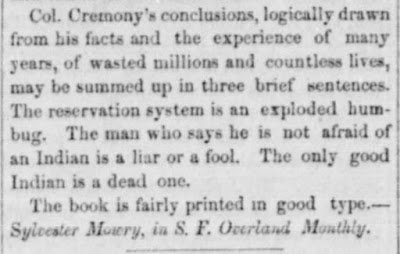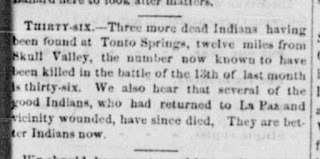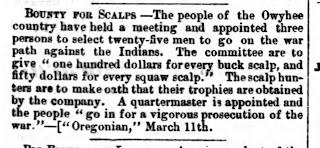1868 - General Sheridan did not coin the phrase, but there's a chance he said it
According to many sources - and I can remember being told this as a kid - General Philip Sheridan supposedly coined the phase:
"The only good Indian is a dead Indian."
The reason I remember this is because our rival football team was the Sheridan Generals, named after Sheridan, who grew up in Somerset, Ohio.. which is not far from my own hometown. (There's a big statue of him in the center of town.)
Even his Wikipedia page (I know... not the best source, but I'm using it as an example) says: Comanche Chief Tosawi reputedly told Sheridan in 1869, "Me, Tosawi; me good Injun," to which Sheridan supposedly replied, "The only good Indians I ever saw were dead." Sheridan denied he had ever made the statement.
I found an earlier reference to this expression, from July, 1866, that says: Utah Items - The Salt Lake Vedette says: "We hear many rumors concerning threatening Indian troubles in the southern and south eastern portion of this Territory. The noble red men of the forest have stolen a large number of oxen, horses, etc., besides killing several residents. The only good Indians on the plains are the dead ones. The life of one white man, woman or child, is worth more than all the red scoundrels in existence." - Source: 1866, July 25 Arizona Miner
 |
| 1866, July 25 Arizona Miner |
On May 28th, 1868, James Cavanaugh, a U.S. Representative from Minnesota and a delegate from the Montana Territory, had a lot to say about the indigenous people of his area, and pretty much, American Indians as a whole. During talks for the Indian Appropriation Bill, Cavanaugh argued that more money should go to Dakota, Idaho and Montana than Nevada and Colorado, because they had more Indians to deal with. (He suggested that Montana alone had three times more indigenous inhabitants than any other territory.) At that time, Nevada and Colorado were to get quite a bit more and Cavanaugh felt this to be unfair. Rep Benjamin Butler or Massachusetts corrected Cavanaugh, stating that he had statistics from the Indian Bureau in 1867:
Montana 13,633 Indians
New Mexico 19,979
Utah 17,600
Dakota 24,440
Colorado 7,000
"... unless the Indians in Montana Territory have been exceedingly fruitful within the last year, I do not think that Territory can have as many Indians as these other Territories," Butler ended.
Cavanaugh would not accept the findings, saying "Ignorance prevails in all Departments" and "Now, I know, that there are more Indians in Montana than in any other Territory, the official statements of the Indian department to the contrary notwithstanding."
Butler asked Cavanaugh if he felt the system for handing the Indians was "a system of corruption and wrong?" after the Montana representative said that it shouldn't be handled through civil means, but rather through the War Department. Cavanaugh asked if he could have five minutes of their time to explain, which was granted:
"Now, sir, I will answer the inquiry of the gentlemen from Massachusetts, although I did not expect this discussion to come up. I will say frankly that, in my judgement, the entire Indian policy of the country is wrong from its inception. In the first place, you offer a premium for rascality by paying a beggarly pittance to your Indian agents. This gentleman from Massachusetts may denounce the sentiment as atrocious, but I will say that I like an Indian better dead than living. I have never in my life seen a good Indian (and I have seen thousands) except when I have seen a dead Indian. I believe in the Indian policy pursued by New England in years long gone. I believe in the Indian policy which was taught by the great chieftain of Massachusetts, Miles Standish. I believe in the policy that exterminates the Indians, drives them outside the boundaries of civilization, because you cannot civilize them."
Of course, Cavanaugh had far more to say, as did other Representatives who chimed in with some extremely interesting comments. I've decided, in an effort to keep this topic on point [ The only good Indian is a dead Indian] Cavanaugh came from an area that wanted to offer scalp bounties, and to exterminate - COMMIT GENOCIDE - of an entire race of people because he felt that their violent reaction to white people invading their lands, taking their resources, corralling them within a reservation and then being starved to death and hunted down --- was a bit too much. His belief, as well as many within that area, was to murder women, children and men and be done with it.
This is why the expression "The Only Good Indian is a Dead Indian" is an important one to discuss. It meant murder. Deliberate murder. And this phrase has been replayed over and over, in the face of American Indians past and recently present, in everything from sports and movies, to books and presidential quotes.
Back to 1868, this from October: The Overland sums up Cremony's "Life among the Apaches" [ a book] as follows: -- "The reservation system is an exploded humbug. The man who says he is not afraid of an Indian is a liar or a fool. The only good Indian is a dead one."
 |
| 1868, Oct 30 Hartford Courant |
 |
| 1868, November 7 The Weekly Arizona Miner |
Just in case you're wondering what the public sentiment in these territories was, here's a few newspaper articles:
 |
| 1866, Sep 12 Arizona Miner |
 |
| 1866, April 14. The Montana Post |
 |
| 1868, Set 17. The Woodstock Sentinel |


